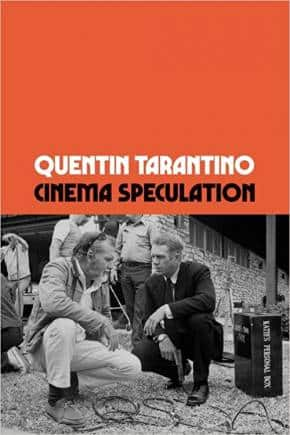In Cinema Speculation, Quentin Tarantino's writing style is similar to the one you’ll find in his blockbusters – informal with a dose of profanity.
I recently watched Joe Swanberg’s comedy drama Hannah Takes the Stairs because I’m a fan of his Netflix series Easy, and found it to be rather underwhelming. Nevertheless, I liked some of the conversations and the performances. If I have to sum up my thoughts about the movie, though, I’ll have to borrow the internet lingo: “it’s all about the feels.”
 Cinema Speculation, 2022 (W&N, 400 pgs, Rs 899).
Cinema Speculation, 2022 (W&N, 400 pgs, Rs 899).
That’s how I felt about Quentin Tarantino’s dive into non-fiction, Cinema Speculation. He brings those unquestionable “feels” to the pages, unlike more seasoned essayists.
Tarantino starts by writing about how he grew up watching movies with his mother and, later, other adults – he presents these anecdotes as though they happened just yesterday. It seems like he’s revisiting them for a grander purpose (probably thanking the moviemakers and the movies that helped him to shape his passion). His nostalgic lenses carry Westerns, action thrillers, gory scenes from horror dramas, and the memories of having caught them in packed houses in the 1960s and 1970s America. He explains his initial reaction, and then goes on to extract the tiny points that he liked in each of them.
He also dedicates an essay to a film critic and another one to a guy who once upon a time dated his mother’s best friend. Again, doesn’t Cinema Speculation feel like a weighty thank you note to his early mentors? Tarantino, just like any master in a creative field, has inspired many minds around the world. He makes stunt choreography look spectacular on the big screen. His characters are also known for their smart turns of phrase – that’s a rarity since dialogues are pushed to the second tier in actioners.
In the newly released book, his writing style is similar to the one you’ll find in his blockbusters – informal with a dose of profanity. But he italicizes many words and sometimes even the names of the actors. What’s the use of emphasizing almost every other word in a paragraph that’s barely longer than an inch? Although my interest in Cinema Speculation was to see Tarantino’s handpicked choices, I was also forced to stress on several verbs and adjectives.
I can listen to the Pulp Fiction director rave about the nuts and bolts that have gone into the making of his favorite shows and movies for hours together, but shouldn’t the act of reading light up another part of the brain? I’m not a scientist of any sort. However, I think reading and talking are two different aspects of communication. I’m not a stickler for rules and I certainly took in all the details that he sprinkled with the selfishness of a child. And I still think his literary work has pizzazz because there’s enough to keep going. But I want him to pay a little more attention to the sentences in his upcoming speculations about cinema.
Now I’ll get back to the loftiest part that resonated with me – a nugget that Tarantino shares about Brian De Palma in which the latter tells the former after being impressed by Reservoir Dogs, “Quentin, don’t get too esoteric with your subject matter, if you want to be allowed to keep making movies, you’ve got to give them a Carrie every once in a while.” This is the kind of mantra that a senior director can easily give a novice. Although box office success cannot be predicted, the goal of every movie would be to reach that milestone because nothing opens up many doors at once like success. (Note: Tarantino produces that quote-unquote passage in italics which I have removed without any malice.)
I definitely kept my eyes open for other such truth bombs, but I couldn’t find any. Even so, I enjoyed the chapter on Taxi Driver as it took me through the numerous changes that were made before the project took off – right from what the screenwriter Paul Schrader meant to do with his anti-hero Travis Bickle (played by Robert De Niro) to the vision that director Martin Scorsese wanted to capture. This is what you get in Cinema Speculation, a no holds barred on some of the classics that kept the heart of Hollywood pumping fresh blood.
Tarantino’s musings on B-movies are also a thing of wonder since they’re not usually spoken about affectionately. Without the slasher films championed by Tobe Hooper (The Texas Chain Saw Massacre) and John Carpenter (Halloween), the horror genre would be quite vacuous today. On a positive note, though, we wouldn’t be bombarded with the shoddily churned out sequels that still continue to take up a large amount of space on streaming platforms.
Cinema Speculation is a fun throwback to the era when going to the theatres was a big deal. Of course, it’s a big deal even now. But our viewing experiences have changed with time and that cannot be disregarded. The motto of those of us who wear cinema on our sleeves – watch, discuss, recommend, and even diss movies – has remained the same, however.